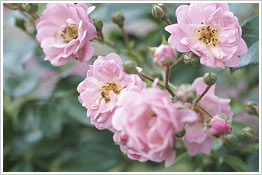Spring, Passover, Easter
Springtime includes special celebrations that reflect different traditions. Every child should understand the historical nature and distinctiveness of spring, Passover, and Easter.
By Caryl W. Krueger
Categories: Spring/Easter The first month of spring is one of tradition and joy for families. Passover starts at sundown on Monday April 4th, and Easter activities culminate on Sunday, the 11th. Unfortunately, most youngsters consider the holiday week to be an opportunity to eat quantities of chocolate, with little regard for the actual meaning of these celebrations. As a caring parent with the desire to increase your children's knowledge, you can reinforce your own family traditions, share some historical facts, and have fun, too. First, let's consider the rich legacy of the past. Every child should understand the historical nature and distinctiveness of spring, Passover, and Easter.
 Egg-making honors Spring Egg-making honors Spring
In pagan times, there was a month-long festival marking the end of winter. Eggs, a symbol of rebirth, were exchanged by Egyptians and Persians who dyed the eggs to give as gifts. Later, Christians in Mesopotamia continued the custom and wrote messages on the eggs they exchanged.
ou might consider exchanging names at your house and letting each family member make a special egg for another, giving thought to a springtime message (such as: "Have a great baseball season") written on the egg.
Of course, there can also be chocolate eggs and bunnies, the latter tradition coming from Germany. It was thought that bunnies brought eggs to poor children during a famine. Ancient people considered the rabbit a symbol of the moon, and the moon determines the date that Lent begins (and Mardi Gras ends), and thus the date of Holy Week and Easter.
Passover
The Jewish festival of freedom marks the exodus from Egypt when the Israelites left slavery and became free. The word Passover came from the stories of plagues brought against the offending Egyptians - the 10th plague being the death of the first-born in every Egyptian home. But, the plague passed over the Israelite homes. The word also refers to the passing over of these people from slavery to freedom. It is also called the Feast of Unleavened Bread because in their haste to escape, the Israelites only had time to bake unleavened bread, called matzah.
Passover is now a celebration held in the home and marked by a feast called the Seder, which can be held one or two nights. At the meal, the head of the family reads the story of the Passover from the Haggadah, the ceremonial book.
Non-Jewish families can also read the dramatic story of the Israelites' escape in the Bible's Old Testament book of Exodus. And, at the grocery store, you can't miss the displays of Passover foods. You might like to try some!
Easter
This Christian celebration marks the resurrection of Jesus Christ. On the streets in Greece, people greet one another with the words "He is risen!" Easter is celebrated at sunrise services and at family dinners which follow a week-long Holy Week. Holy Week starts with Palm Sunday, commemorating the day Jesus entered Jerusalem. Palm fronds were spread before him on the dusty roadway.
Your celebration might include eating hot cross buns, which is a British custom. An English rhyme commemorates the custom of wearing a new outfit for the holiday. It says "At Easter let your clothes be new, or else be sure you will it rue." An Irish custom is to eat eggs at dawn and then dance! Belgian children hide nests for the Easter bunny to fill. At the White House, usually on Monday after Easter, there is a giant party of egg-rolling that was originated in 1878 by President Rutherford B. Hayes. And, of course, there is the Easter parade on Fifth Avenue in New York City.
The name for Easter comes from the Hebrew word, Pesah. The Italians call Easter "Pasqua," the Spanish spell it "Pascua," and the French word is "Pasques." It's fun to use these words.
However you choose to celebrate this week, you can enrich your family's appreciation for tradition. Worship together as a family, write on eggs, light candles, eat special foods. Be sure your children know that there is much more to this week than chocolate bunnies and colored eggs!
Just remember our motto: family life is a happy adventure together! |